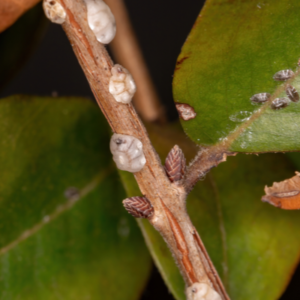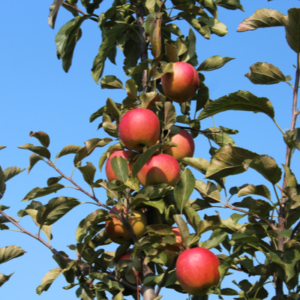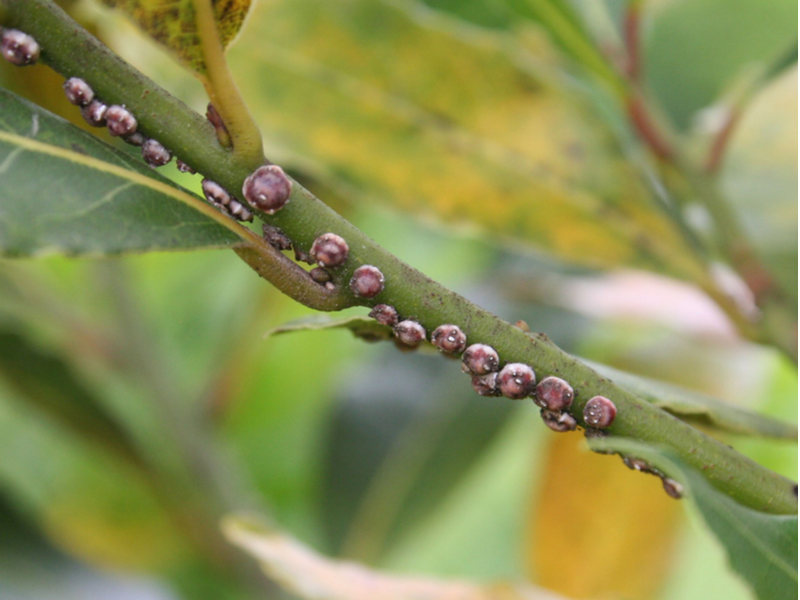Tree Scale: What Is It and How Do You Treat It?
As we try to protect our trees from damaging insects, there is one group of insects that usually gets overlooked. Scales or tree scales are tiny insects that feed on the sap of trees and plants. Depending on the species, scales can cause a lot of damage to Michigan trees and fruit trees.
As the insects feed, their piercing mouthparts inject a toxin into the plant as it feeds, causing yellowing of tissue, reduced growth, and branch dieback. Soft scale insects secrete a waste called honeydew, which can attract bees, wasps, ants, and flies. Honeydew can also be the host of fungus called black sooty mold, which can make your trees look attractive. Although sooty mold is harmless if there is enough present, it could shade out sunlight and stunt the tree’s growth.
There are two types of scale insects: armored scales and soft scales.

Soft Scale Insects
- Produce honeydew, a sugary liquid waste product
- Tend to be bigger than their armored counterparts
- Shaped like rounded bumps
- Secrete a waxy substance over their bodies for protection
Armored Scale Insects
- Don’t produce honeydew
- Smaller, fatter, rounder than soft scale insects
- Have a hard shell to protect them
Types of Scale Found In Michigan
Tree scale is a particular problem in Michigan because of our fruit trees. One of those is the nasty San Jose Scale. San Jose Scale feeds on a variety of our beloved fruit trees, including pear, apple, plum, and peaches. Young trees are the most vulnerable and can be killed in just a few years. San Jose scales can also feed on the fruit and leaves of the trees, causing bright red spots and reduced yield.
Signs of Tree Scale
Infestations can weaken host trees or even kill the tree if it is bad enough. Damage to an infected tree can include:
- Yellowing leaves
- Tiny bumps covering branches (insects)
- Slower growth
- Premature leaf drop
- Branch dieback
Treating Tree Scale
Scales have a unique life cycle that makes them rather hard to control. When temperatures warm up in the spring, overwintering scales emerge from a protective wax covering and mate. Unlike other insects, female scales give birth to live young instead of laying eggs. She can give birth to 150-500 crawlers during the season. Crawlers are so named because they are born with six legs and spend their time crawling around the tree and feeding on the sap. After three weeks, the crawlers molt and lose their legs and antennas to become armored adults.
Management of tree scale is tricky and varies from species to species. As we mentioned above, these insects have either a protective wax coating or a hard shell, making controlling these insects difficult. Dormant oils are moderately effective on overwintering soft scale species but need to be applied in early spring before trees come out of dormancy. They are even less effective on armored scale species. Natural enemies, such as birds, wasps, flies, and beetles, feed on adults, as well as crawlers.
The trick to controlling tree scale is to know when they are at their most vulnerable, which is the crawler stage. Properly timed insecticide sprays can help manage tree scale by killing the young crawlers. Unfortunately, the adults are well protected against chemical attacks.
Your Trusted Tree Service
Keeping your trees protected from tree scales can keep them strong and healthy, but sometimes infestations are just too much for the tree. When trees die, it is usually from diseases or infestations. The most responsible thing to do in these instances is to remove the tree to prevent it from spreading to others.
At PPM Tree Service & Arbor Care, we offer tree trimming, pruning, and removal services.
Give us a call at (877) 454-8733 or request a quote here. Hear about the latest news and offers from PPM by following us on Twitter and Facebook. Don’t forget to check out the monthly PPM Tree blog for all your tree care tips and tricks.


